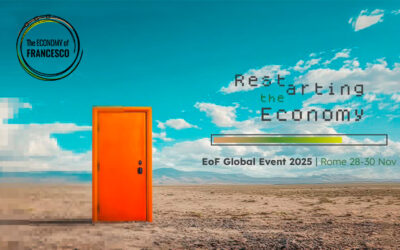Two characters tell the story: Tom, who died a few years ago, and his wife Jeanne, who shared the experience with him. “My market sector was shrinking, and I decided it was time to start my own business with the money I had saved. That was when I heard about the economy of communion, and was immediately attracted by the prospect of providing not only for our own family, but for the needs of many throughout the world.” “Preparing and sharing food was a long tradition in the Petrucci family, so we decided to open a restaurant in Camarillo, California, called Petrucci’s.” Jeanne, who worked in the restaurant in recent years, describes how Tom managed the business. “He wanted things so that everyone who worked with him had the opportunity to better themselves. If someone had been hired to wash dishes or to drive, but wanted to improve, Tom always gave them the chance to do so. If anyone became an expert in their new job, and there was nowhere to progress, he made no attempt to keep them. Many of them had families to support and Tom wanted them to better themselves and enjoy success.” Tom wrote: “In our restaurant we try to work as if everything depends on us, while knowing that everything really depends on God. Jeanne and I know that we will never make huge profits, but we feel that by giving work to ten people, and ensuring the income of ten families, while at the same time making a contribution to reducing poverty, we have reached much bigger objectives, which are of an eternal kind.” “In a short moment of morning meditation we choose a key idea to put into practice during the day. At times I am bombarded with thousands of ideas about how to run the restaurant better, how to make more money, and so on, but unity with the others permits me to stay focused on “what really counts.” That moment spent together in the morning strengthens within my soul the decision that Jeanne and I took when we set out on this adventure: to love in the present moment and to try not to do our will, but the will of God. When we began we knew very little about how to run a restaurant. If it has been a success, it is because it is part of His plans.” “From the very first month we opened, we decided to give a monthly sum for the poor, however things went. This was an act of faith that helped us to give top priority to the importance of giving.” (Tom and Jeanne Petrucci, from L’amore come piatto principale in Economia di Comunione, quarterly, Year X/n.2, novembre 2004)
Reach out to those in need
Reach out to those in need




0 Comments